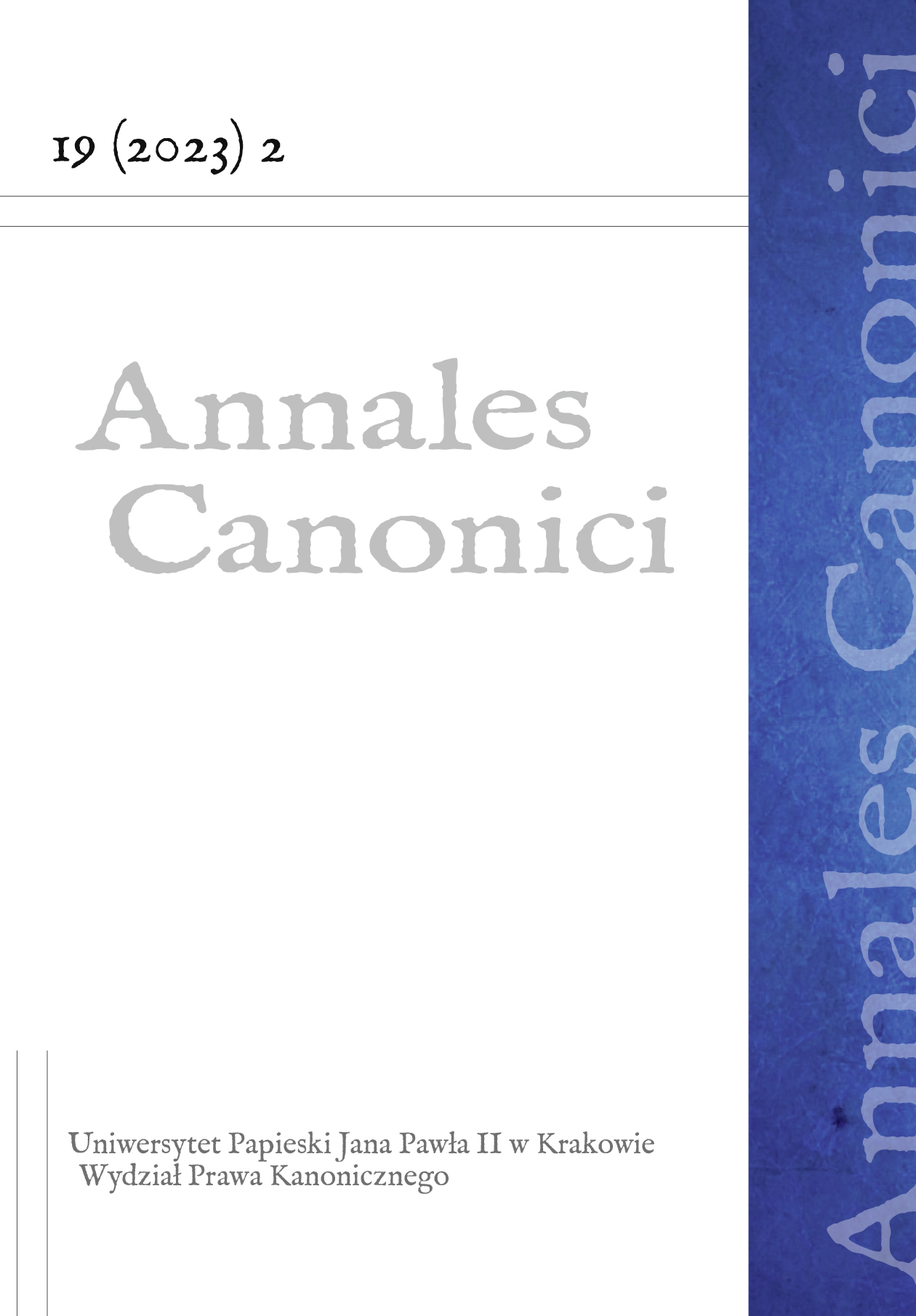Kanoniczne konsekwencje nieodbierania przesyłek poleconych przez proboszcza na przykładzie kazusu
DOI:
https://doi.org/10.15633/acan.19203Słowa kluczowe:
administracja kościelna, ochrona danych, Kościelny Inspektor Ochrony Danych, korespondencja, delikty dyscyplinarne, delikty karneAbstrakt
Artykuł dotyczy kanonicznych konsekwencji związanych z nieodbieraniem przez proboszcza przesyłek poleconych adresowanych do parafii. Celem artykułu jest ocena z punktu widzenia prawa kanonicznego takiego zaniechania tego organu i reprezentanta parafii. Autorzy wskazują na delikty dyscyplinarne (niewypełnianie wiernie obowiązków, niereprezentowanie parafii, brak współpracy z Kościelnym Inspektorem Ochrony Danych) oraz karne (przestępstwo nadużycia albo zaniedbania urzędu), które można przypisać proboszczowi. Wniosek jest następujący: nieodbieranie poczty przez proboszcza może skutkować dla niego negatywnymi konsekwencjami.
Bibliografia
Codex Iuris Canonici auctoritate Ioannis Pauli PP. II promulgatus, 25.01.1983, „Acta Apostolicae Sedis” 75 (1983) pars 2, s. 1–317, tekst polski: Kodeks prawa kanonicznego promulgowany przez papieża Jana Pawła II w dniu 25 stycznia 1983 roku. Stan prawny na dzień 18 maja 2022 r. Zaktualizowany przekład na język polski, zatwierdzony przez Konferencję Episkopatu Polski, Poznań 2022.
Dekret ogólny w sprawie ochrony osób fizycznych w związku z przetwarzaniem danych osobowych w Kościele katolickim wydany przez Konferencję Episkopatu Polski, w dniu 13 marca 2018 r., podczas 378. Zebrania Plenarnego w Warszawie, na podstawie kan. 455 Kodeksu Prawa Kanonicznego, w związku z art. 18 Statutu KEP, po uzyskaniu specjalnego zezwolenia Stolicy Apostolskiej z dnia 3 czerwca 2017 r., „Akta Konferencji Episkopatu Polski” (2018) nr 30, s. 31–54.
Jougan A., Słownik kościelny łacińsko-polski, Poznań–Warszawa–Lublin 1958.
Kongregacja ds. Duchowieństwa, Kapłan, pasterz i przewodnik wspólnoty parafialnej. Instrukcja, 4.08.2002, https://www.vatican.va/roman_curia/congregations/cclergy/documents/rc_con_cclergy_doc_20020804_istruzione-presbitero_pl.html.
Kroczek P., Parafia w optyce katolickiej i luterańskiej. Studium teologiczno-
-prawne, Kraków 2017.
Krukowski J., Kaleta P., Komentarz do Kodeksu Prawa Kanonicznego, t. 4: Księga VI. Sankcje karne w Kościele, red. J. Krukowski, Poznań 2022.
Lempa F., Przestępne nadużycie władzy kościelnej w prawie powszechnym Kościoła łacińskiego, Lublin 1991.
Millot G., La négligence dans l’exercice des charges. Approche en droit canonique penal, Roma 2014.
Sacrosanctum Concilium Oecumenicum Vaticanum II, Decretum Christus Dominus de pastorali Episcoporum, 28.10.1965, „Acta Apostolicae Sedis” 58 (1966), s. 673–696; tekst łacińsko-polski: Sobór Watykański II, Dekret o apostolskich zadaniach biskupów Kościele „Christus Dominus”, w: Sobór Watykański II, Konstytucje, dekrety, deklaracje, Poznań 2008, s. 362–407.
Skonieczny P., Przestępstwo kanoniczne naruszenia przepisów Kościoła w Polsce o ochronie danych osobowych. Komentarz do art. 42 ust. 2–4 dekretu KEP z 13 marca 2018 roku, „Annales Canonici” 16 (2020) nr 1, s. 59–106.
Sztafrowski E., Pozycja proboszcza w prawie kodeksowym, „Prawo Kanoniczne” 35 (1992) nr 1–2, s. 35–69.
Ustawa z dnia 17 maja 1989 r. o stosunku Państwa do Kościoła Katolickiego, t.j. Dz. U. z 2023 r. poz. 1966.
Pobrania
Opublikowane
Numer
Dział
Licencja

Utwór dostępny jest na licencji Creative Commons Uznanie autorstwa 4.0 Międzynarodowe.
Autorzy publikujący w czasopiśmie udzielają jego wydawcy zgody o następującej treści:
- Autor zachowuje autorskie prawa majątkowe do utworu, a jednocześnie udziela wydawcy czasopisma zgody na jego pierwszą publikację w wersji drukowanej i wersji online na licencji Creative Commons Uznanie autorstwa 4.0 Międzynarodowe oraz zgody na wykonywanie opracowań, w tym przekładów.
- Autor ma możliwość udzielania zgody niewyłącznej na opublikowanie utworu w wersji, która ukazała się w czasopiśmie (np. zamieszczenia go w repozytorium instytucjonalnym lub opublikowania w książce), wraz z informacją o jego pierwszej publikacji w czasopiśmie.
- Autor może umieścić swój utwór online (np. w repozytorium instytucjonalnym lub na swojej stronie internetowej) jeszcze przed zgłoszeniem utworu do czasopisma.

